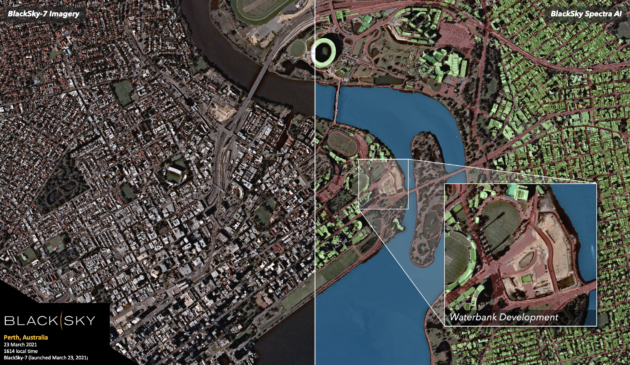
That didn’t take long: BlackSky says the latest Earth observation satellite in its growing constellation delivered its first imagery less than a day after it was launched into orbit from New Zealand on Monday.
Once the BlackSky 7 satellite was deployed from the kick stage on Rocket Lab’s Electron launch vehicle, it took mere hours for BlackSky’s team to check out the satellite and downlink pictures. Those pictures were then analyzed by BlackSky’s Spectra AI suite of machine language algorithms to identify points of interest.
For example, one of the images could be used to track progress on Perth’s Waterbank urban development site in Australia — a billion-dollar project that’s generated its share of controversy over the years.
BlackSky CEO Brian O’Toole said the 24-hour turnaround demonstrates how quickly BlackSky’s geospatial data platform can respond to global developments.
“The maturity of the BlackSky architecture enables the rapid and reliable addition of satellites into our constellation,” O’Toole said today in a news release. “BlackSky’s ability to scale its sensor and analytic infrastructure allows the company to deliver first-to-know insights for customers.”
O’Toole said BlackSky can offer “on-demand capacity” to its customers, thanks to the ability to expand its network rapidly.
BlackSky has offices in Seattle as well as in Herndon, Va. — and its satellites are manufactured by LeoStella, a joint venture between Black Sky Holdings and Thales Alenia Space that’s headquartered in Tukwila, Wash.
BlackSky 7 is the seventh satellite in BlackSky’s Earth observation constellation. The company’s Spectra AI platform combines satellite data with other intelligence sources to provide AI-enabled insights into global hotspots and hot topics — for example, how the coronavirus pandemic is affecting economic activity.
Today BlackSky announced that it has struck a deal with Rocket Lab to have nine of its satellites sent into orbit by the end of the year, including BlackSky 7. The other eight Gen-2 satellites will be deployed during four missions to come.
“We’re proud to be working with Rocket Lab to achieve this launch cadence and advance our constellation network configuration, which is the foundation of our high-revisit imaging performance,” O’Toole said.
Launch logistics will be handled by Seattle-based Spaceflight Inc., which was BlackSky’s sister subsidiary until the two corporate entities parted ways last year.
Last month, BlackSky Holdings said it expected to become a publicly traded company this summer by virtue of a merger with Osprey Technology Acquisition Corp. Osprey is a special-purpose acquisition company, also known as a SPAC or a blank-check company. BlackSky’s SPAC pact is part of a trend that’s sweeping financial markets and transforming the aerospace frontier.
By 2023, BlackSky plans to start launching an array of Gen-3 satellites that will provide images with 50-centimeter (20-inch) pixel resolution and short-wave infrared capabilities for low-light and nighttime imaging. Upgrading to Gen-3 would mark a major step toward completion of BlackSky’s 30-satellite constellation.
from GeekWire https://www.geekwire.com/2021/blackskys-latest-satellite-delivers-first-pictures-ai-insights-just-hours-launch/